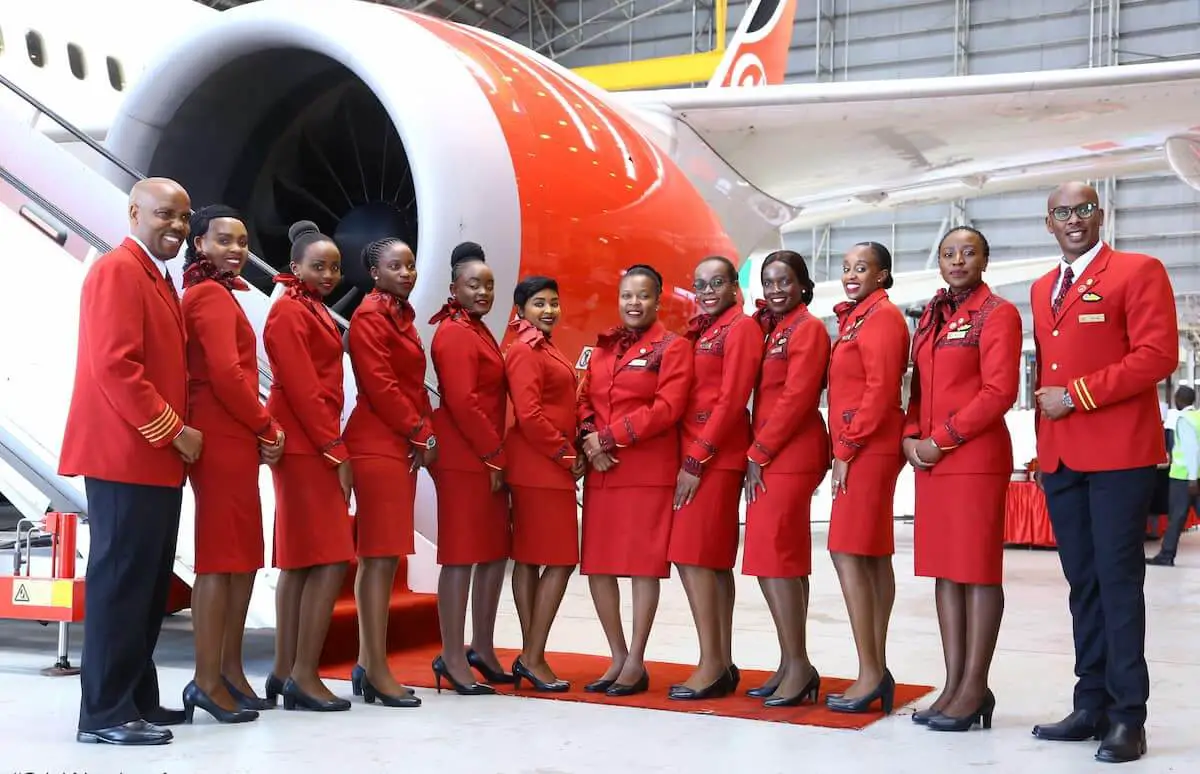As the airline industry continues to expand, the demand for cabin crew professionals has doubled.
This has led to an increase in the number of institutions offering cabin crew courses.
However, there is a growing concern among students about whether pursuing a cabin crew course is marketable, especially in Kenya.
In this post, I will delve deeper into ins and outs of a cabin crew course, exploring the requirements, responsibilities, perks, drawbacks, and career prospects of this highly sought-after profession.
Hopefully, by the end of this post, you’ll gain valuable insight into why a career as a cabin crew member could be a good fit for you.
What is a Cabin Crew Course?
A cabin crew course is designed to equip students with the necessary skills and knowledge to work as flight attendants or air hostesses.
The course covers a range of topics, including customer service, safety procedures, in-flight catering, emergency response, and communication skills.
Generally, the course aims to prepare students for the challenges of working in the aviation industry by providing them with a comprehensive understanding of the role of cabin crew members and the various responsibilities involved. This includes ensuring the safety and comfort of passengers, providing excellent customer service, and responding effectively to emergency situations.
Successful completion of cabin crew course will enable you to work as cabin crew members on various airlines, and the skills gained can also be applied in related industries such as hospitality and tourism.
Is a Cabin Crew Course Marketable in Kenya?
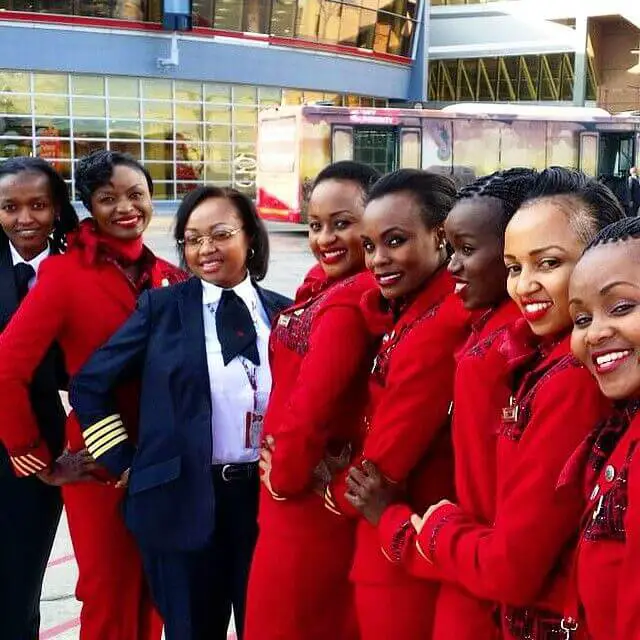
The short answer is yes.
Graduates of cabin crew courses in Kenya rarely struggle to find employment, as there are numerous opportunities available to them.
With excellent grades and the right skillset, you’re likely to secure a job with an airline in no time.
See, the airline industry is growing rapidly in Kenya, and with this growth comes a need for more cabin crew professionals.
In fact, according to a past report by the International Air Transport Association (IATA), Africa is projected to be one of the fastest-growing aviation market in the world over the coming years, with an annual growth rate of about 5%.
Furthermore, Kenya is home to a number of international airlines, including Kenya Airways, Ethiopian Airlines, Qatar Airways, Emirates, Cargolux S.A, Precision Air, and Turkish Airlines.
These airlines are constantly hiring new cabin crew members, and a cabin crew course can increase your chances of being hired.
What are the Benefits of Pursuing a Cabin Crew Course?
I. Job Opportunities
As mentioned earlier, the airline industry in Kenya is growing rapidly, and there is a high demand for cabin crew professionals.
Pursuing a cabin crew course can increase your chances of being hired by one of the major airlines in the country.
II. Travel Opportunities
Working as a cabin crew member allows you to travel to different parts of the world.
You will have the opportunity to explore new cultures, meet new people, and experience different lifestyles.
III. Career Growth
Many cabin crew members start out as flight attendants and work their way up to management positions.
So, pursuing a cabin crew course can open up opportunities for career growth and advancement within the airline industry.
IV. Good Salary
Cabin crew members in Kenya earn a good salary, which can increase with experience and seniority (learn more in the subsequent section).
In addition, they are entitled to various benefits such as free travel and health insurance.
V. Job Security
The aviation industry is considered to be one of the most stable and secure industries in the world. This means that pursuing a career in the aviation industry can provide you with long-term job security.
VI. Networking Opportunities
Working as a cabin crew member can provide you with many networking opportunities.
You will meet people from different backgrounds, cultures, and professions.
You will also have the opportunity to network with other professionals in the aviation industry, which can be beneficial if you are looking to advance your career.
Potential Challenges of a Cabin Crew Career
While a career as a cabin crew member can be highly rewarding, there are some challenges to be aware of.
Dealing with difficult clients and situations is par for the course, and you’ll likely be away from home for extended periods due to frequent travel.
You’ll also need to be prepared to cope with jet lag and work long hours.
Being on call and working holidays and weekends are also common requirements.
How much does a cabin crew earn in Kenya?
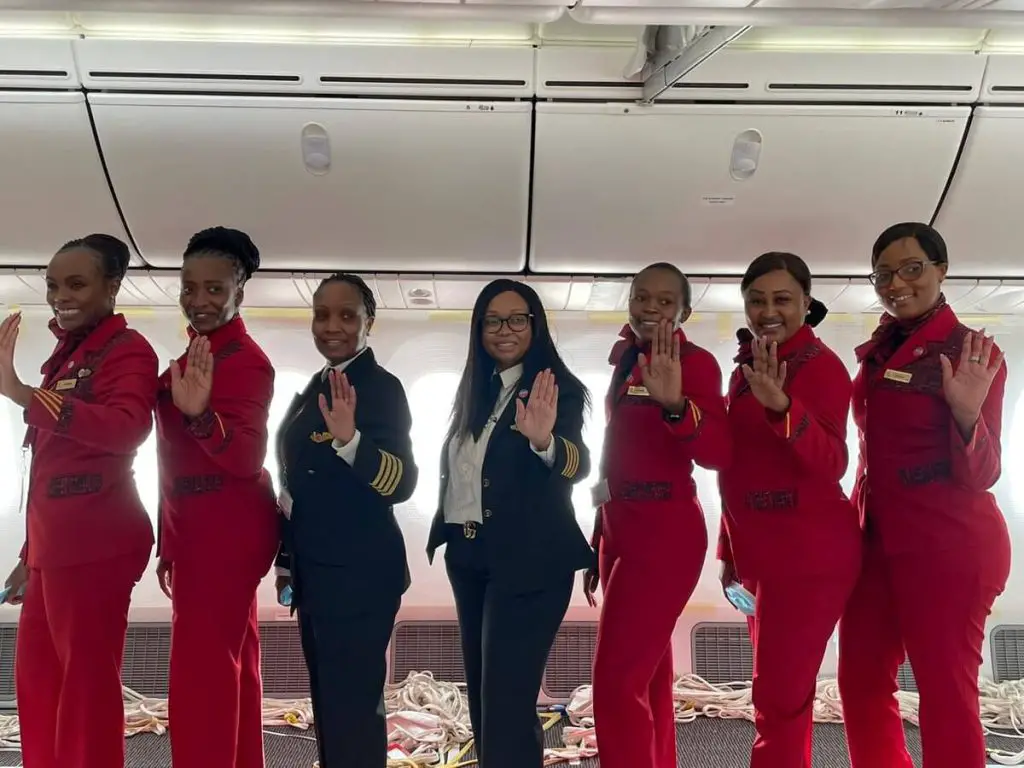
Salary of cabin crew members in Kenya can vary depending on a number of factors, such as the airline they work for, their level of experience, and the number of hours they work.
However, on average, a cabin crew member in Kenya can earn between KES 80,000 to KES 150,000 per month.
International airlines like Qatar Airways and KLM are rumored to pay their cabin crew members even higher—up to KES 200,000.
And allowances can even push these figures even further!
Even better, some airlines may offer other additional benefits to their cabin crew members, such as medical insurance, free accommodation, and travel allowances.
Additionally, experienced and highly skilled cabin crew members may earn more than entry-level crew members.
It’s also worth noting that a cabin crew member’s earnings may also be influenced by the performance of the airline and the aviation industry as a whole.
During times of economic downturn, airlines may reduce salaries and other benefits in order to cut costs.
Related: Revealed: Jambo Jet Cabin Crew Monthly Salaries
How much does it cost to study cabin crew in Kenya?
The cost of studying cabin crew in Kenya can vary depending on the institution offering the course, the type of course, and the duration of the course.
Generally, cabin crew courses in Kenya can cost anywhere from Ksh 50,000 to Ksh 250,000.
Like any other course in Kenya, you may sometimes find institutions that offer scholarships or financial aid to students who meet certain requirements, such as academic excellence or financial need.
PRO TIP: It’s important to research the various institutions offering cabin crew courses and compare their fees, as well as the quality of education provided, before making a decision.
It’s also important to consider additional costs such as accommodation, transportation, and course materials, which may add to the overall cost of studying cabin crew in Kenya.
What qualifications do you need to study cabin crew?
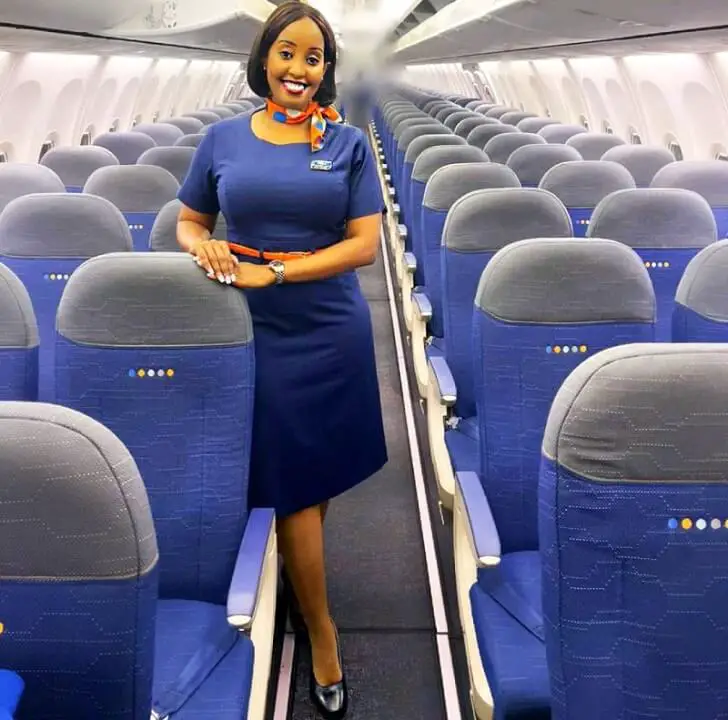
Generally, to enroll in a cabin crew course in Kenya, you will need to have completed your high school education (with a mean grade of C- (minus) or have an equivalent qualification such as a diploma.
Some institutions may require you to have specific subjects or grades, such as a minimum of a C- in subjects like English and Mathematics, while others may not have such requirements.
In addition to educational qualifications, some institutions may have specific physical requirements that applicants must meet. For example, applicants may need to meet certain height and weight requirements, have good eyesight, and be in good physical health.
It’s also important to note that some institutions may require applicants to pass certain assessments, such as a medical examination, an English proficiency test, and an interview. These assessments are designed to ensure that applicants have the necessary skills and qualities to work as cabin crew members.
How long is a cabin crew course in Kenya?
It can vary depending on the institution offering the course. Generally, cabin crew courses in Kenya can range from 6 months to 1 year.
Some institutions offer courses that are as short as 3-6 months, while others offer courses that last up to 1 year.
The duration of the course can also depend on the type of course you are taking. Some institutions offer basic cabin crew courses, while others offer advanced courses that cover a wider range of topics.
Basic courses may be shorter in duration, while advanced courses may require more time to complete.
Cabin Crew Training
Most airlines in Kenya offer a further certification process that takes about six weeks to complete.
During this process, you’ll learn about first aid, airline safety rules, and the basics of flight.
You’ll also learn how to operate safety equipment and audio and visual equipment on board.
You’ll need to complete several hours of training and may also need to pass a pre-employment test, as the requirements vary by airline.
Institutions offering cabin crew courses in Kenya
| Institution | Location/Address |
| Transeastern Airlines Aviation College | Agriculture House, Harambee Ave, Nairobi Phone: 020 2513396 |
| Air-Hostess Academy | Savani House, Meru Rd, Mombasa Phone: 0728 888949 |
| Skyways Aviation Training Institute | New Sunbeam Shopping Complex (4th Floor), Mfangano St, Nairobi Phone: 020 2508617 |
| East African School Of Aviation | Fedha Rd, Nairobi Phone: 020 6823607 |
| Air Travel & Related Studies Centre | Rhino Park Road, Nairobi Phone: 0721 380590 |
| Africa College Of Aviation And Management | Nature Hse, Tom Mboya St, Nairobi Phone: 0729 697412 |
| Airways Travel Institute | 1st Floor, Occidential Plaza, Nairobi Phone: 020 3753863 |
| KIPS Technical College | Tom Mboya Street, Nairobi Phone: 0720 813113 |
| Mombasa College Of Tourism And Business Studies | Rex House, Moi Ave, Mombasa Phone: 0795 707733 |
| Kenyatta University School of Hospitality and Tourism | http://hospitality.ku.ac.ke/ |
| Epic Aviation College | Development Hse, Nairobi Phone: 020 2210078 |
Cabin Crew future job prospects
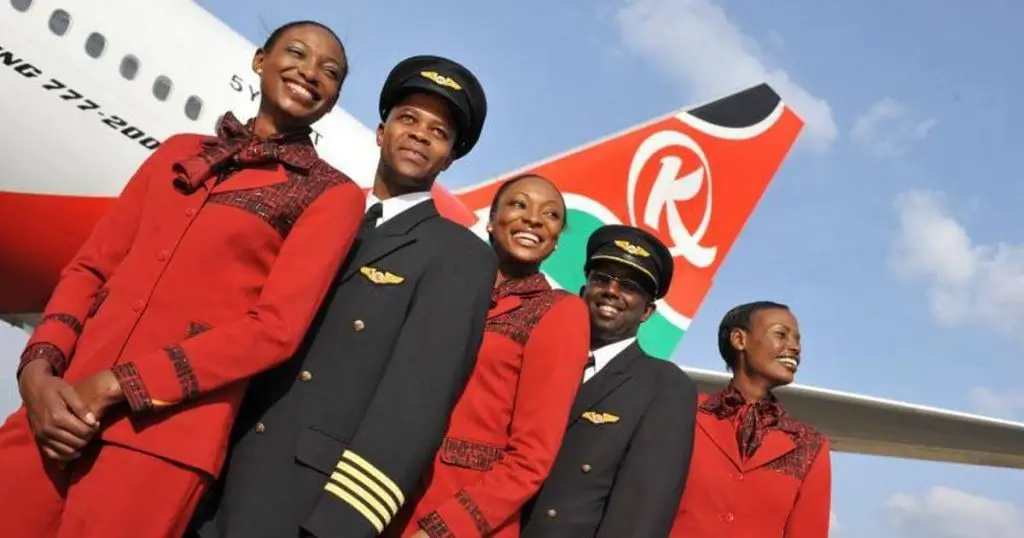
Generally, the future job prospects for cabin crew profession is positive.
While the Covid 19 pandemic had a significant impact on the global aviation industry, it’s expected to recover in the coming years, with jobs associated with it also increasing in demand.
In fact, some experts predict a 30% growth in cabin crew occupation until 2030, taking into account retirements and projected growth.
Conclusion
So, is cabin crew course marketable in Kenya?
Absolutely!
Pursuing a cabin crew course in Kenya is a wise and well-calculated career move.
The airline industry is growing rapidly, and there is a high demand for cabin crew professionals.
Pursuing a cabin crew course can increase your chances of being hired in the industry in general, and it can also open up opportunities for career growth and advancement.
If you have a passion for travel, enjoy meeting new people, and are interested in a career in the airline industry, then a cabin crew course may be the perfect fit for you.

